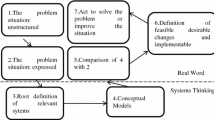Abstract
Identifying the practical benefits of theoretical methods is a challenge in several fields. The operational research approach, known as Soft, has achieved a field of study status and, from that, Problem Structuring Methods (PSM) have been consolidated as support tools in the group decision process. Thus, aiming to contribute to the improvement of the group decision process, this paper presents the results of an experiment involving 42 students of the Management Engineering major in a general decision process. Strategic Options Development and Analysis is a PSM that uses cognitive maps to express the group’s understanding of a problem. Some practical implications on the use of cognitive maps are evaluated by establishing hypotheses. Such implications were drawn from the comparison of each participant’s personal evaluation of the decision-making process to the final decision taken by the group along with observations and analysis of the groups that employed, and the ones that did not employ the cognitive mapping technique.




Similar content being viewed by others
References
Ackerman F, Eden C and Cropper S (1992). Getting started with cognitive mapping. Published in the proceedings of the 7th Young Operational Research Conference. University of Warwick, UK, pp 65–82.
Champion D and Wilson JM (2010). The impact of contingency factors on validation of problem structuring methods. Journal of the Operational Research Society 61(9): 1420–1431.
Coelho D, Antunes CH and Martins AG (2010). Using SSM for structuring decision support in urban energy planning. Technological and Economic Development of Economy 641(4): 641.
Cronin K, Midgley G and Jackson LS (2013). Issues mapping: A problem structuring method for addressing science and technology conflicts. European Journal of Operational Research 233(1): 145–158.
Domínguez A, Saenz-de-Navarrete J, de-Marcos L, Fernández-Sanz L, Pagés C and Martínez-Herráiz J (2013). Gamifying learning experiences: Practical implications and outcomes. Computers & Education 63: 380–392.
Eden C (1990). Strategic thinking with computers. Long Range Planning 23(6): 35–43.
Eden C (1992). A framework for thinking about group decision support systems (GDSS). Group Decision and Negotiation 1(3): 199–218.
Eden C and Ackermann F (2004). SODA—The principles. In: Rosen-head J and Mingers J (eds). Rational Analysis for a Problematic World Revisited. John Wiley & Sons: Chichester, pp 21–42.
Engel RJ and Schutt RK (2014). Fundamentals of Social Work Research. 2nd edn, SAGE Publications, Inc.: California.
Fan S, Shen Q and Lin G (2007). Comparative study of idea generation between traditional value management workshops and GDSSsupported workshops. Journal of Construction Engineering and Management 133(10): 816–825.
Franco LA and Montibeller G (2010). Facilitated modelling in operational research. European Journal of Operational Research 205(3): 489–500.
Gregory A, Atkins J, Burdon D and Elliott M (2013). A problem structuring method for ecosystem-based management: The DPSIR modeling process. European Journal of Operational Research 227(3): 558–569.
Jackson MC (2000). Systems Thinking: Creative Holism of Managers. Englad, John Wiley & Sons.
Jackson MC (2001). Critical systems thinking and practice. European Journal of Operational Research 128(2): 233–244.
Jackson MC (2010). Reflections on the development and contribution of critical systems thinking and practice. Systems Research and Behavioral Science 27(2): 133–139.
Joldersma C and Roelofs E (2004). The impact of soft OR-methods on problem structuring. European Journal of Operational Research 152(3): 696–708.
Jun G, Morris Z, Eldabi T, Harper P, Naseer A, Patel B and Clarkson J (2011). Development of modelling method selection tool for health services management: From problem structuring methods to modelling and simulation methods. BMC Health Services Reserach 11(1): 108.
Kato H, Shiroyama H and Nakagawa Y (2014). Public policy structuring incorporating reciprocal expectation analysis. European Journal of Operational Research 233(1): 171–183.
Lagfield-Smith K and Wirth A (1992). Measuring differences between cognitive maps. Journal of the Operational Research Society 43(12): 1135–1150.
Levin J and Nalebuff B (1995). An introduction to vote-counting schemes. The Journal of Economic Perspectives 9(1): 3–26.
Midgley G, Cavana R, Brocklesby J, Foote J, Wood D and Ahuriri-Driscol A (2013). Towards a new framework for evaluating systemic problem structuring methods. European Journal of Operational Research 229(1): 143–154.
Mingers J (2011). Soft OR comes of age—But not everywhere. Omega 39(6): 729–741.
Mingers J and Rosenhead J (2004). Problem structuring method in action. European Journal of Operational Reserach 152(3): 530–554.
Morais D, Alencar LH, APCS Costa and Keeney RL (2013). Using value-focused thinking in Brazil. Pesquisa Operacional 33(1): 73–88.
Morton A, Ackermann F and Belton V (2007). Problem structuring without workshops? Experiences with distributed interaction within a PSM process. Journal of the Operational Research Society 58(5): 547–556.
Phi G, Dredge D and Whitford M (2014). Understanding conflicting perspectives in event planning and management using Q method. Tourism Management 40: 406–415.
Rosenhead J (1996). What’s the problem? An introduction to problem structuring methods. Interfaces 26(6): 117–131.
Rosenhead J and Mingers J (eds) (2001). Rational Analysis for a Problematic World Revisited. John Wiley & Sons: Chichester.
Rouwette E, Bastings I and Hans B (2011). A comparison of group model building and Strategic Options Development and Analysis. Group Decision and Negotiation 20(6): 781–803.
Samarasinghe S and Strickert G (2013). Mixed-method integration and advances in fuzzy cognitive maps for computational policy simulations for natural hazard mitigation. Environmental Modelling & Software 39: 188–200.
White L (2006). Evaluating problem-structuring methods: Developing an approach to show the value and effectiveness of PSMs. The Journal of the Operational Research Society 57(7): 842–855.
Zhang H, Song J, Su C and He M (2013). Human attitudes in environmental management: Fuzzy cognitive maps and policy option simulations analysis for a coal-mine ecosystem in China. Journal of Environmental Management 115: 227–234.
Acknowledgements
This study is part of a research program funded by the Brazilian Research Council (CNPq), to whom the authors are grateful. We are also grateful to the two anonymous referees for their comments and suggestions, which helped us to improve the draft.
Author information
Authors and Affiliations
Corresponding author
Rights and permissions
About this article
Cite this article
Cunha, A., Morais, D. Analysing the use of cognitive maps in an experiment on a group decision process. J Oper Res Soc 67, 1459–1468 (2016). https://doi.org/10.1057/jors.2016.19
Published:
Issue Date:
DOI: https://doi.org/10.1057/jors.2016.19




